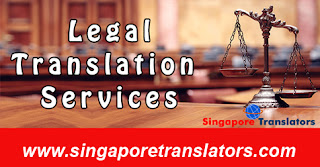Is Legal Translation Services Required In Singapore For Organ Transplantation?
Inside the following piece, I will talk about the use of legal
translation services in organ transplantation.
Basically, an organ is removed from one body and placed in the
recipient's body. The organ that has been successfully transplanted include
heart, kidney, liver, lungs, pancreas, intestine, thymus, and uterus. In
Singapore, organ donation varies in two ways that are very helpful to save
life 1.HOTA2.MTERA
HOTA: If we
discuss the Human organ transplantation act that allows the liver, heart,
corneas, and kidney to be removed when a person dies from any cause. It covers
all the Singaporean citizens and permanent residents 21 years old and above.
MTERA( Medical (Therapy,
education and research) Act:
If we discuss MTERA basically this scheme allows a donor to donate his organs
for transplant purposes after his/her death.
In Singapore for organ transplantation, the identification related
document needs the legal translation services. In most cases both donor and
recipient document is not in the medium hence they seek the translation of the
documents that is fully acceptable by legal authority.
Opting out from HOTA:
If a person wants to opt-out of the human organ transplantation act then
he registers an objection with medical services using the HOTA opt-out Form.
This kind of form indicates the objection. After the completion, this form sent
to the national organ transplant unit. The person who is opted out from Hota
will get an acknowledgment of the objection. This objection of the acknowledgment
can be withdrawn.
By completing the withdrawal of an objection to organ removal form which
will be sent to the National organ transplant unit. But note that by opting of
HOTA one would be given lower priority to another who has not opted out HOTA.
Use of translation services in Living donor organ transplant:
If we discuss the living donor organ transplant, organ transplant from a donor who is still alive is generally not allowed if the requirement of section
15A of the HOTA.
In a hospital, the specified organ is removed with written authorization
of the transplant committee of the hospital. In some emergency cases, the
written authorization services require the legal description into govt official
language. Then legal translation services are grand use.
The donor of the specific organ has given the consent to remove the
specified organ from his body and has not revoked or withdrawn the consent.
Before the organ donation, the potential living donor attends the
counseling session which is including an interview conducted by the Ministry of Health(MOH). Hence, he/she requires some necessary documents for identification, medical, and legal use. So, in this situation, both donor and recipient need translation services for understanding the legal procedure associated with organ transplantation.
Process of organ transplantation:
The process of organ transplantation include the following steps as
1.Identification of potential donor by the hospital
2.Evolution of donor eligibility
3.Authorization of organ recovery
4.Medical maintenance of the patient
5.Matching organs to potential recipients
6. Offering organ regionally then nationally
7.Placing organ and coordinating recovery
8.surgical recovery of organs
9.Preparing recipients for surgery
10.Distribution of organs
11.Funeral and burial plans
12. Follow up with family and hospital
Conclusion:
Additionally, the law associated with organ transplantation is
inadequate. When an organ donor wants to donate his organ he/she always thinks
about good medical treatment. If him/her medical document is not as per MOH(ministry of health) & legal use then he/she will require an authentic translation of documents. Basically, such kinds of the document are translated by the top certified translation agency.



Comments
Post a Comment